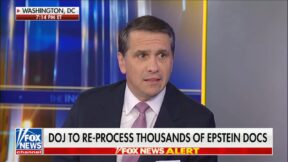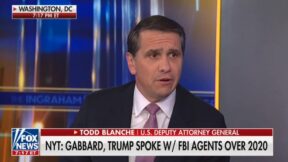Trump Losing Grip on MAGA Media as Tucker Carlson, Laura Ingraham Challenge Him

(AP Photo/Julia Demaree Nikhinson)
Tucker Carlson’s latest video challenging FBI Director Kash Patel over the Butler, Pennsylvania, assassination attempt isn’t just another high-profile critique — it’s a signal that the incentives driving MAGA media are shifting in ways Trump may no longer control. In a video expose published Friday, Carlson meticulously documented Thomas Crooks’s digital radicalization: violent threats against Democratic congresswomen in 2019, followed by public mockery of Trump supporters in 2020. Yet the FBI claimed Crooks had “minimal online presence.”
Less than a year ago, Carlson spoke at the 2024 Republican National Convention — a prime-time slot reserved for Trump’s closest allies — a reminder that this is not a fringe voice but a central figure in MAGA media. That proximity makes his pivot all the more striking: Trump’s handpicked validators are now under direct scrutiny from the audience they once cultivated.
Patel and Deputy Director Dan Bongino have defended the bureau’s account, with Bongino — a former conservative media critic of the FBI — now telling audiences bluntly: “In some of these cases, the there you’re looking for is not there.” To Carlson, this represents institutional resistance that undermines MAGA credibility, even when Trump’s handpicked leadership is involved.
For years, MAGA media acted as a loyalist shield, defending Trump from scandals and policy failures alike. Carlson himself, despite his often skeptical lens, maintained a symbiotic position of alignment when direct challenges to Trump would have cost him credibility. But Carlson’s Epstein coverage under Bill Barr’s DOJ foreshadowed the present tension: he repeatedly questioned why investigators didn’t pursue Ghislaine Maxwell’s client lists, flight logs, and financial records more aggressively.
Now, with Patel at the FBI’s helm, Carlson sees the same institutional resistance continuing — a through-line from Barr to Trump’s second-term leadership that he frames as a failure to deliver accountability.
Carlson contends that Patel and Bongino misrepresented Crooks’s online presence and concealed evidence of radicalization — a claim that puts him in direct conflict with the very figures Trump appointed to restore institutional credibility. Patel’s emphasis on personal involvement in the investigation and Bongino’s insistence on speaking “the truth” rather than audience expectations highlight a collision of incentives: Trump’s appointed officials want institutional credibility and closure, while media figures like Carlson need ongoing transparency to maintain audience trust.
This tension isn’t confined to Carlson. Laura Ingraham, Fox News’ long-standing Trump ally, confronted the president directly about economic failures in a primetime interview. She asked pointed questions: “Why are drug prices still rising when you promised to cut them?” and “How is your tariff policy helping families who can’t afford groceries?” Coming from a figure who has historically been a loyalist voice, this represents a broader pattern: MAGA media isn’t just tolerating scrutiny; it’s rewarding independence when audiences perceive it as authentic and populist.
Ingraham’s challenge reflects realities Trump can’t wish away: inflation remains elevated, housing is unaffordable for young families, and tariff policies that promised relief have delivered mixed results at best. When economic anxieties are this acute, even loyal media figures can’t pretend away policy failures without risking credibility
What ties these moments together isn’t ideology — Carlson and Ingraham don’t see eye-to-eye on everything — but incentives.
Both have learned their audiences reward accountability over partisan cheerleading. When Trump was out of office, defending him was not good politics for conservative voices and good business: there was no accountability to deliver, only loyalty to perform. Now that he’s governing, holding him accountable drives engagement and preserves credibility in ways uncritical support no longer can.
When you are serving a second term in office, you suddenly become the “deep state” open to criticism, convinced that anyone in charge is by default corrupt. MAGA media has evolved into a semi-autonomous check on Trump, answering to their viewers as much as to any political operator.
The political implications are significant. Trump built his coalition in large part by capturing the media ecosystem: Fox primetime, talk radio, and conservative digital platforms amplified his every word. But when Carlson can publicly challenge his FBI director and Ingraham can demand accountability on economic policy without audience pushback, Trump’s ability to control the narrative now seems compromised.
This didn’t happen overnight. Carlson’s scrutiny of Epstein, Butler, and economic policy demonstrates. Carlson has also seemed to aggressively curry critics with what many reasonably see as a dark turn evidenced by platforming a Neo-Nazi in Nick Fuentes and open criticism of Israel. But executive orders and policy announcements can be made, by Trump, but media gatekeepers with independent authority now dictate which stories shape the base’s perception.
This isn’t a sudden rebellion. Carlson’s scrutiny of Epstein, Butler, and economic policy demonstrates a methodical, years-long pattern of prioritizing populist credibility over party loyalty. Ingraham’s intervention signals that this dynamic has extended to mainstream MAGA outlets. The incentive structure has flipped: audiences reward scrutiny, and those who deliver it are empowered.
The MAGA media shield that once protected Trump is fracturing. The influencers who built his coalition are no longer extensions of his political operation — they are independent arbiters enforcing populist standards that his administration cannot consistently meet. Trump may control the government, but he no longer controls the gatekeepers who control access to his base. In MAGA politics, that may matter more than any policy victory.
This is an opinion piece. The views expressed in this article are those of just the author.
New: The Mediaite One-Sheet "Newsletter of Newsletters"
Your daily summary and analysis of what the many, many media newsletters are saying and reporting. Subscribe now!






Comments
↓ Scroll down for comments ↓